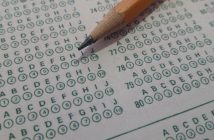
On September 29, Tsinghua International School (THIS) welcomed President David Leebron of Rice University and his wife, Y. Ping Sun, as their last stop of the day after visiting Tsinghua University. As co-editor-in-chief of the school newspapaper The Spartan Times, I was able to sit down with Professor Leebron, his wife Y. Ping Sun, and others to discuss university admissions, college life, and the future of both international and higher education.
Can you tell us what you’re working on in Beijing?
Here in Beijing, today’s visits were with Tsinghua University, and tomorrow’s is with Peking University. Our goal is to try and move forward joint programs such as student exchanges, and joint research programs.
More and more Chinese and US universities seem to be collaborating. Where do you see the future of cooperation between international institutions of higher education?
It would continue to be very complex. I do think there will be more student mobility, [and]eventually you’ll see undergraduates in dual degree programs. I would love, for example, to have an undergraduate degree [program]at a university like Tsinghua. There’s going to be an increasing number of [multicultural]people, so I think you’re going to see people [traveling overseas for school more]. We now take over 50 students from China each year [at Rice University]in our entering class of 950 students. So that’s a significant part of our student population.
There’s a lot of interest among high school students around the world to attend US universities. Up until now, standardized testing has been the best way to gain acceptance. Recently however, Hampshire College stopped taking SAT and ACT scores. Do you think this will continue to be a trend for colleges and universities?
I think that tests are going to continue to evolve. I think you’re going to see more schools go SAT-optional or get rid of the SAT. There’s going to be a few schools who just don’t think it’s useful, but you’re also going to see a lot of schools do it because they think that will help drive up [the number of]their applications. For Rice, we’re getting [18,000] applications for 950 places. We want whatever information we can get – we don’t want you to overvalue that information, but we still think the SAT is valuable.
One problem that has emerged is that there are many quality students who want to go to top-notch colleges, but too little resources, and too few schools. What kind of solution would you propose?
Our [current]solution is to expand the student body. We expanded by 30 percent, so now we’re educating, in percentage terms, more students than we used to. If you look at the top universities, it’s interesting that most of them have not grown their student bodies very much, but I think you’re going to see more schools growing [their student bodies.]But what [really]has grown, according to some analyses, is the number of schools that are regarded as top universities, including lots of state schools. For example, in Texas, where before there was only the University of Texas, there’s also Texas A&M, [and]they offer pretty high quality education.
You mentioned that for international students applying to colleges and universities in the US, environment is a big factor. Rice University has been consistently ranked as one of the schools with the happiest students. How does Rice University help international students integrate with other students and the environment?
There are lots of different kinds of international students we get. We get the Chinese citizens, who’ve spent the last three years in a boarding school in New England – they’re international students – or you have American students who’ve been abroad for a very long time. They’re not international students, but they may have some of the same challenges. We do have a special week-long program for international students [in which]we bring them in early because more things need to be explained to them. Some are pretty serious such as the Honor Code*; some of the students we get from foreign locations [don’t understand] the basic principles. But the way we mostly succeed is by integrating students into a system that is very supportive and relatively small scale. At Rice, though many students spend one year off campus, we don’t have fraternities, sororities, or special dorms, so when you come into our residential college system, that’s a four-year system, the first thing that happens is that you’re welcomed by upperclassmen on campus. So the typical Rice student knows students three years in front of them, and three years behind them. And then you have advisers at the college level, as well as people living in the college assigned to provide advice.
*The Honor Code is a system unique to Rice where a council of students manages student life and handles any misdemeanors.
Rhea Jiang is a senior at Tsinghua International School, an international campus affiliated with Tsinghua High School. She is the co-editor-in-chief for the school newspaper, the Spartan Times, and co-president of the debate club. Through her blog posts, Rhea hopes to share her unique thoughts and experiences at Tsinghua International School.
The beijingkids student correspondent program gives high school students with an interest in writing and journalism a resource for guidance, feedback, and real-life training. If you are a student interested in becoming a beijingkids student correspondent, or you know a student who is, please contact yvetteferrari@beijing-kids.com
Photo: Ceremony and Reception – Rice University (Google Images)



